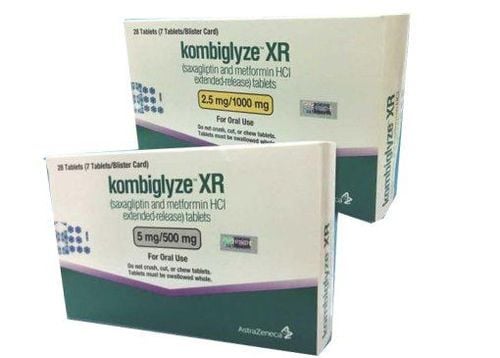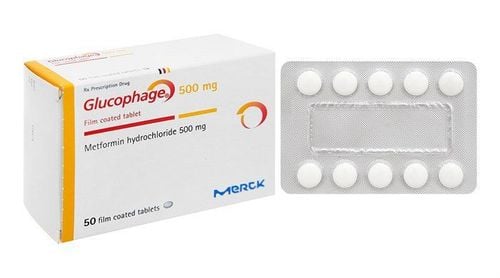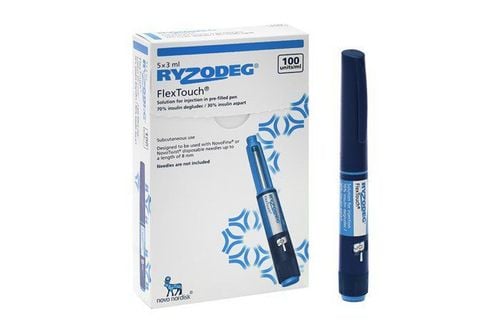This is an automatically translated article.
Xigduo is indicated as an adjunct to diet and exercise to improve glycemic control in adults with type 2 diabetes mellitus when treatment with both dapagliflozin and metformin is appropriate.
1. What is Xigduo?
Manufacturer: Astrazecena Company
Xigduo drug is made in the form of film coated tablets
Box contains 4 blisters x 7 extended release film coated tablets.
Main ingredients:
Metformin: 1000-mg Dapagliflozin: 10-mg
2. Uses of Xigduo
2.1 Indications Xigduo is indicated for use in the following cases:
Indicated as adjunctive therapy to diet and exercise to improve glycemic control in adults with diabetes mellitus type 2 when appropriate to both dapagliflozin and metformin:
In patients not adequately controlled with metformin monotherapy at maximally tolerated doses. Combination with other hypoglycemic agents, including insulin, in patients with inadequate glycemic control with metformin and these agents. In patients already receiving the combination of dapagliflozin and metformin as separate tablets. Limitations of use
Xigduo is not recommended in patients with type 1 diabetes or diabetic ketoacidosis.
2.2 Dosage - How to use Adults
Take 1 tablet, 1 time / day in the morning with food.
For dapagliflozin-nave patients, the recommended starting dose for dapagliflozin is 5 mg once daily. The dose may be adjusted based on efficacy and tolerability while not exceeding the maximum daily dose: 10 mg dapagliflozin and 2000 mg metformin HCl. Patients taking the maximum dose of metformin XR should skip the last dose before starting XIGDUO XR. Patients with renal impairment
Xigduo is contraindicated in patients with an estimated glomerular filtration rate (eGFR) less than 30 ml/min/1.73 m2. No dose adjustment for Xigduo is necessary in patients with an eGFR greater than or equal to 45 ml/min/1.73 m2). Xigduo is not recommended in patients with an eGFR less than 45 ml/min/1.73 m2. Patients with hepatic impairment
Not recommended in patients with hepatic impairment.
Note: The above dosage is for reference only. The specific dose depends on the condition and the progression of the disease. To get the right dose, you need to consult your doctor or healthcare professional.
2.3 Missed dose, overdose and management Overdose:
Dapagliflozin
There have been no reports of overdose during the clinical development of dapagliflozin. In the event of an overdose, contact the hospital's poison control unit. The use of supportive measures according to the clinical condition of the patient is also appropriate. Elimination of dapagliflozin by dialysis has not been studied.
Metformin hydrochloride
Overdosage of metformin hydrochloride has occurred, including ingestion of doses > 50g. Hypoglycemia was reported in about 10% of cases, but no causal relationship with metformin hydrochloride was established. Lactic acidosis has been reported in approximately 32% of metformin overdose cases. Metformin can be dialyzed with clearances up to 170 ml/min under good hemodynamic conditions. Therefore, hemodialysis may be useful to remove accumulated drug from patients in whom an overdose is suspected.
Missed dose:
If you miss a dose, take it as soon as possible. However, if it is almost time for your next dose, skip the missed dose and take your next dose at the scheduled time. Note that double the prescribed dose should not be taken.
3. Side effects of the drug Xigduo
When using Xigduo®, you may experience unwanted effects (ADRs). Very common, ADR > 1/10
Metabolic and nutritional disorders: Hypoglycemia (when used with SU or insulin). Gastrointestinal disorders : Gastrointestinal symptoms. Common, 1/100 < ADR < 1/10
Infections and parasitic infections of the skin and appendages: vulvovaginitis, balanitis and other genital tract infections, urinary tract infections. Nervous disorders: Taste disturbance, dizziness. Skin and subcutaneous tissue disorders: Rash. Musculoskeletal and connective tissue disorders: Back pain. Renal and urinary tract disorders: Difficulty urinating, polyuria. Subclinical: Increased hematocrit, decreased renal creatinine clearance, dyslipidemia. Uncommon, 1/1000 < ADR < 1/100
Infections and parasitic infections of the skin and appendages: Fungal infections. Metabolism and nutrition disorders: Volume depletion, thirst. Digestive disorders: Constipation, dry mouth. Renal and urinary tract disorders: Nocturia, renal failure. Reproductive system and mammary gland disorders: Vaginal - vulva pruritus, genital pruritus. Subclinical: Increased blood creatinine, increased blood urea, weight loss. Rare, 1/10000 ≤ ADR < 1/1000
Metabolic and nutritional disorders: Diabetic ketoacidosis. Very rare, ADR < 1/10000
Metabolic and nutritional disorders: Lactic acidosis, Vitamin B12 deficiency. Hepatobiliary disorders: Liver dysfunction, hepatitis. Skin and subcutaneous tissue disorders: Urticaria, erythema, pruritus.
4. Notes when using Xigduo
Before using the drug you need to carefully read the instructions for use and refer to the information below.
Contraindications
Xigduo® is contraindicated in the following cases:
Hypersensitivity to the active substance or any of the excipients of the drug. Any acute metabolic acidosis (eg, lactic acidosis, diabetic ketoacidosis). Diabetic pre-coma. Renal failure (GFR < 60 ml/min). Acute conditions with the potential to change kidney function such as: Dehydration, severe infection, shock. Acute or chronic diseases can cause tissue hypoxia such as: Heart or respiratory failure, myocardial infarction, shock. Liver failure. Acute alcohol poisoning, alcoholism. Use with caution
Patients with cardiovascular disease, being treated with antihypertensive drugs with a history of hypotension, have increased hematocrit. Patients taking loop diuretics or pioglitazone, moderate to severe renal impairment: Not recommended. Elderly ≥ 75 years: Initiation of treatment with dapagliflozin is not recommended, Bladder cancer or galactose intolerance, Lapp lactase deficiency or glucose-galactose malabsorption: Not recommended. Efficacy and safety in children 0 -< 18 years: Not established. Treatment for type 1 diabetes is not indicated. If ketoacidosis is suspected, consider discontinuing or suspending treatment. Discontinue dapagliflozin while being treated for pyelonephritis or urinary tract infections. Glucose/urine test (+) due to medication. Pregnant and lactating women: Not recommended. Temporarily discontinue treatment prior to radiographic studies using iodinated contrast material in patients with a history of liver disease, alcoholism, or heart failure and in all patients who will receive i-contrast contrast. iodine in the arteries; may resume 48 hours after adequate renal function is confirmed.
5. Drug interactions
Diuretics (increased diuretic effect, increased risk of dehydration and hypotension). The 1.5-AG measurement is not reliable in the assessment of blood glucose in patients taking SGLT2 inhibitors.
Storage:
Store the medicine at a temperature not exceeding 30°C.
Please dial HOTLINE for more information or register for an appointment HERE. Download MyVinmec app to make appointments faster and to manage your bookings easily.













